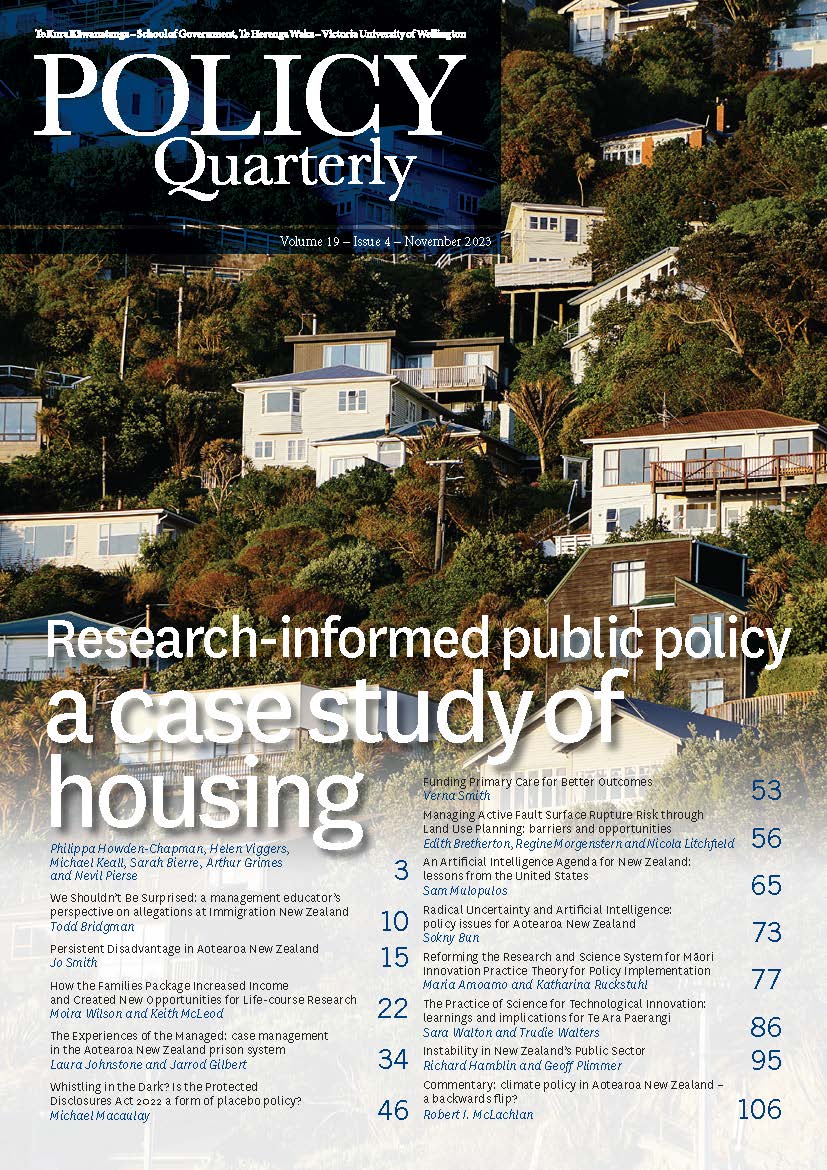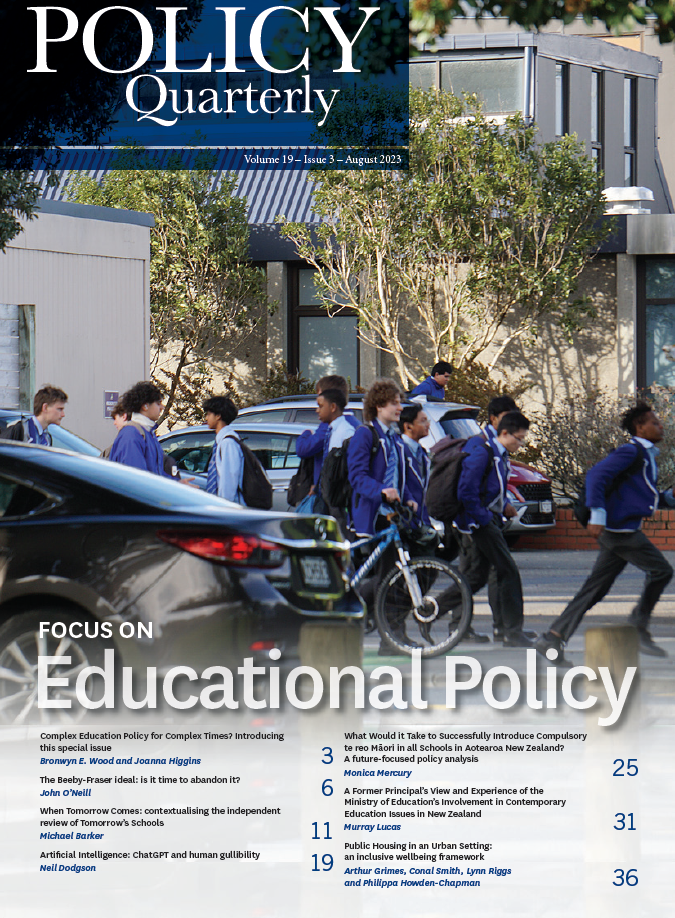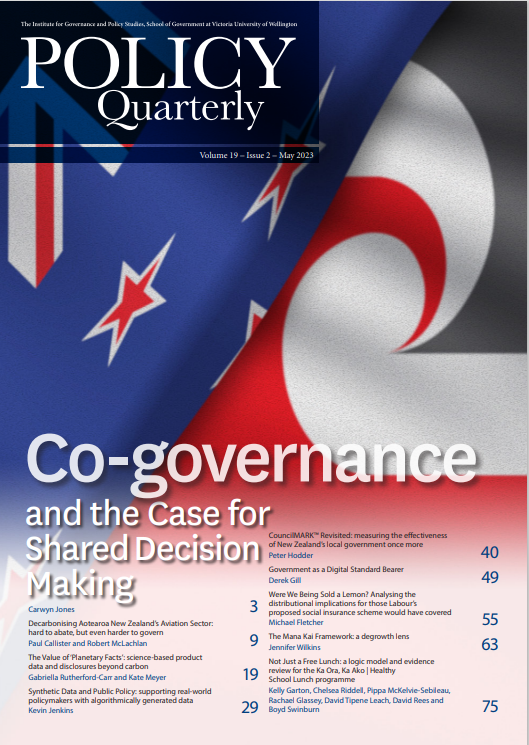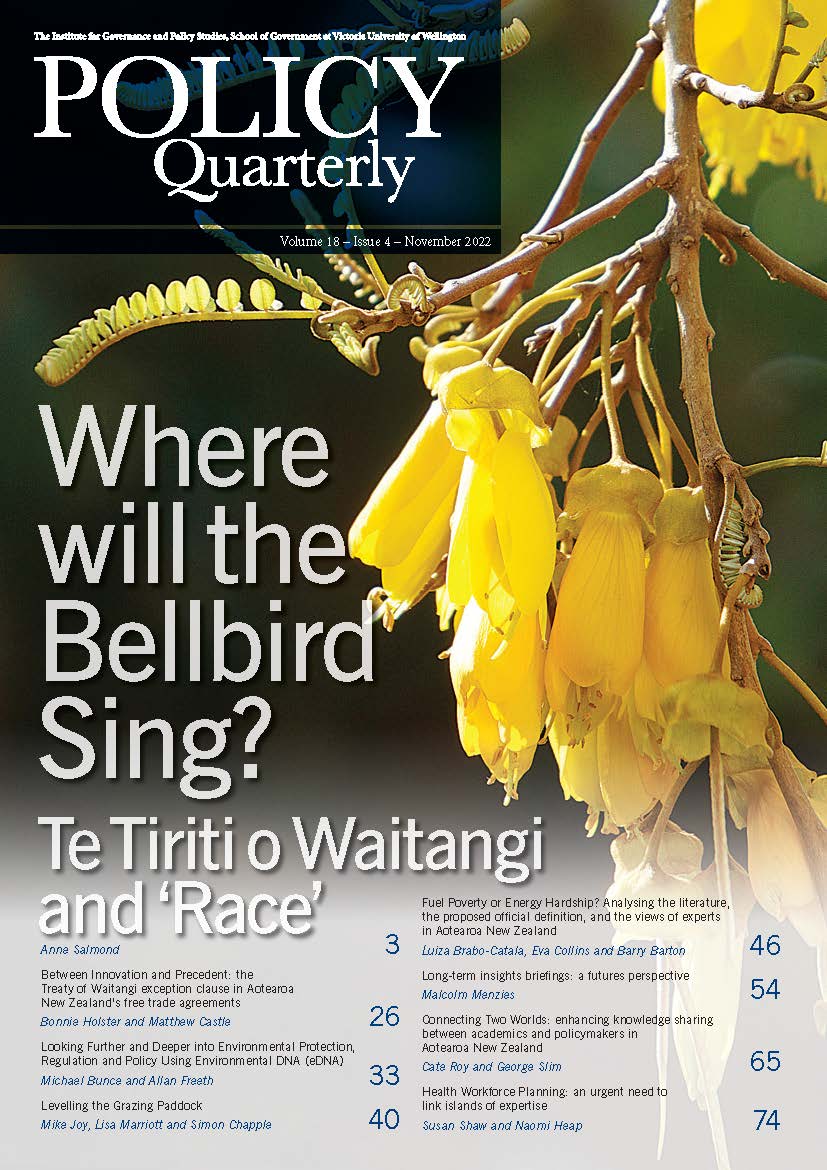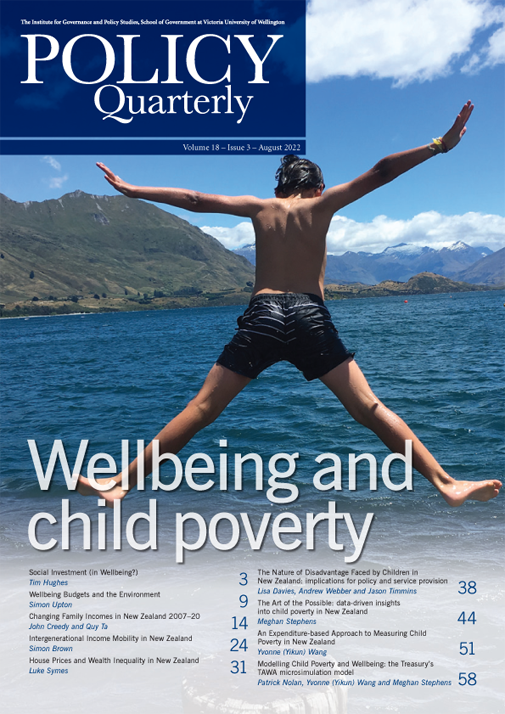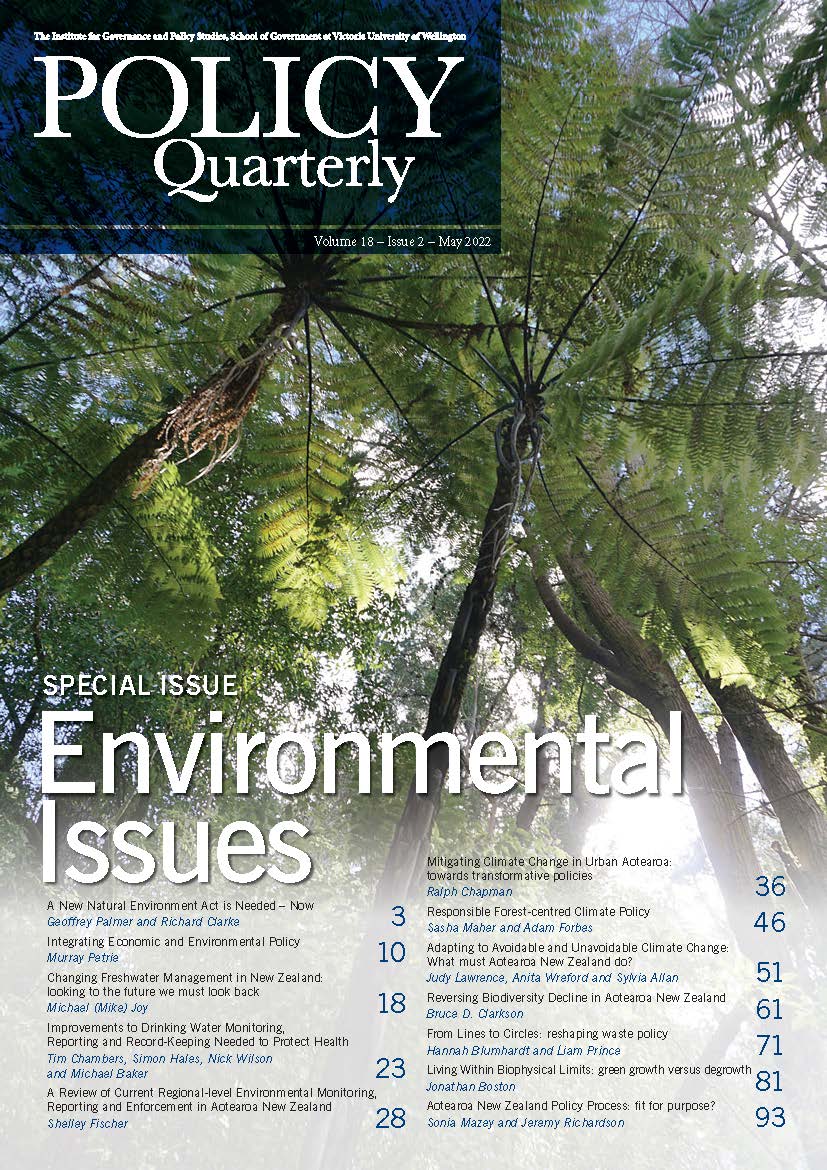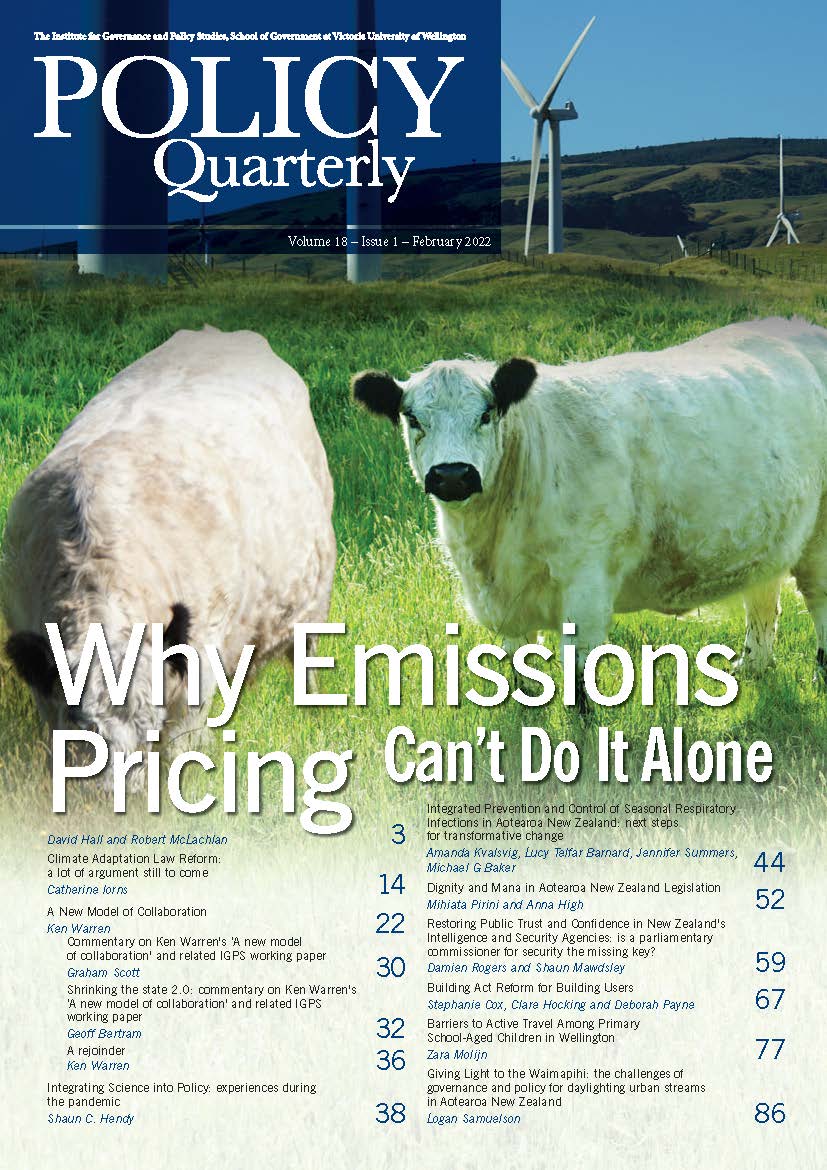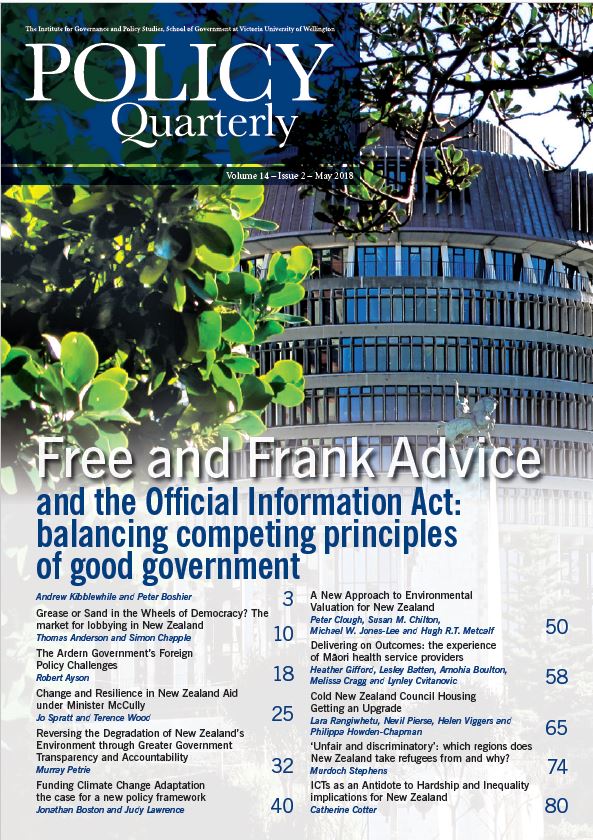Archives
-
Policy Quarterly
Vol. 20 No. 1 (2024)Special Issue: Public Administration. International Perspectives
-
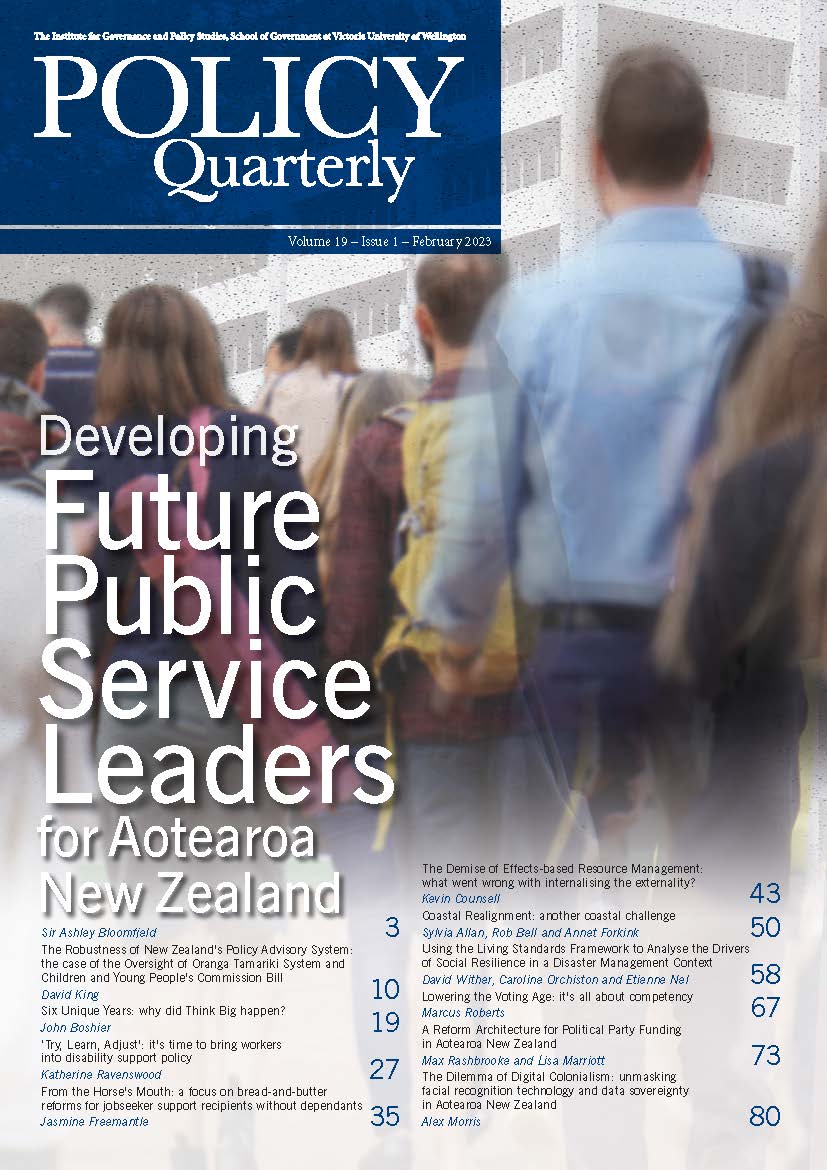
Policy Quarterly.
Vol. 19 No. 1 (2023)Developing Future Public Service Leaders for Aotearoa New Zealand.
-
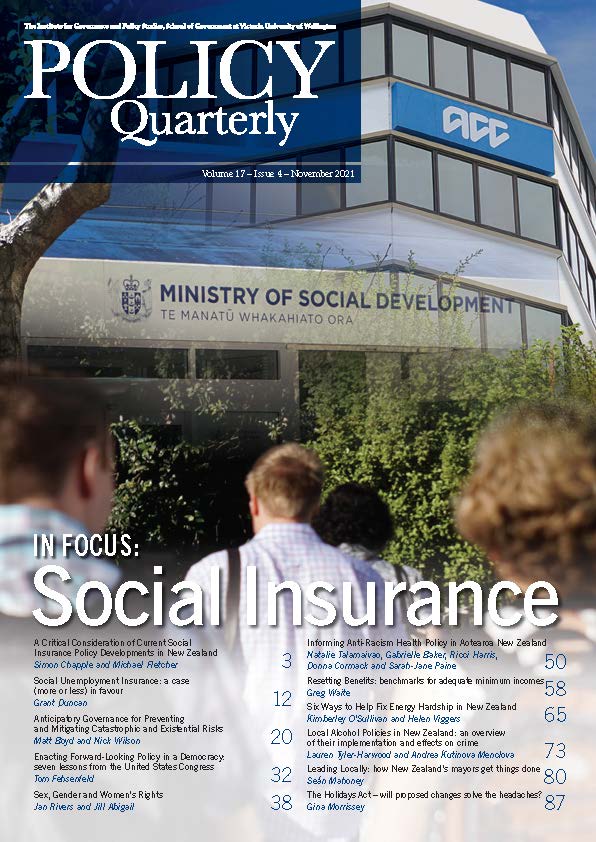
Policy Quarterly. In Focus: Social Insurance
Vol. 17 No. 4 (2021)The November issue of Policy Quarterly is a general, rather than special, issue. As such, it covers a wide range of contemporary policy debates, mostly but not exclusively focused on domestic policy matters in Aotearoa New Zealand. In particular, the issue includes two contrasting perspectives on the Labour government's proposal to move to a greater reliance on social insurance and two analyses of anticipatory governance and long-term policy-making, along with contributions on the following topics: gender, racism, income adequacy, energy hardship, the control of alcohol sales, the role of mayors, and changes to the Holiday's Act.
-
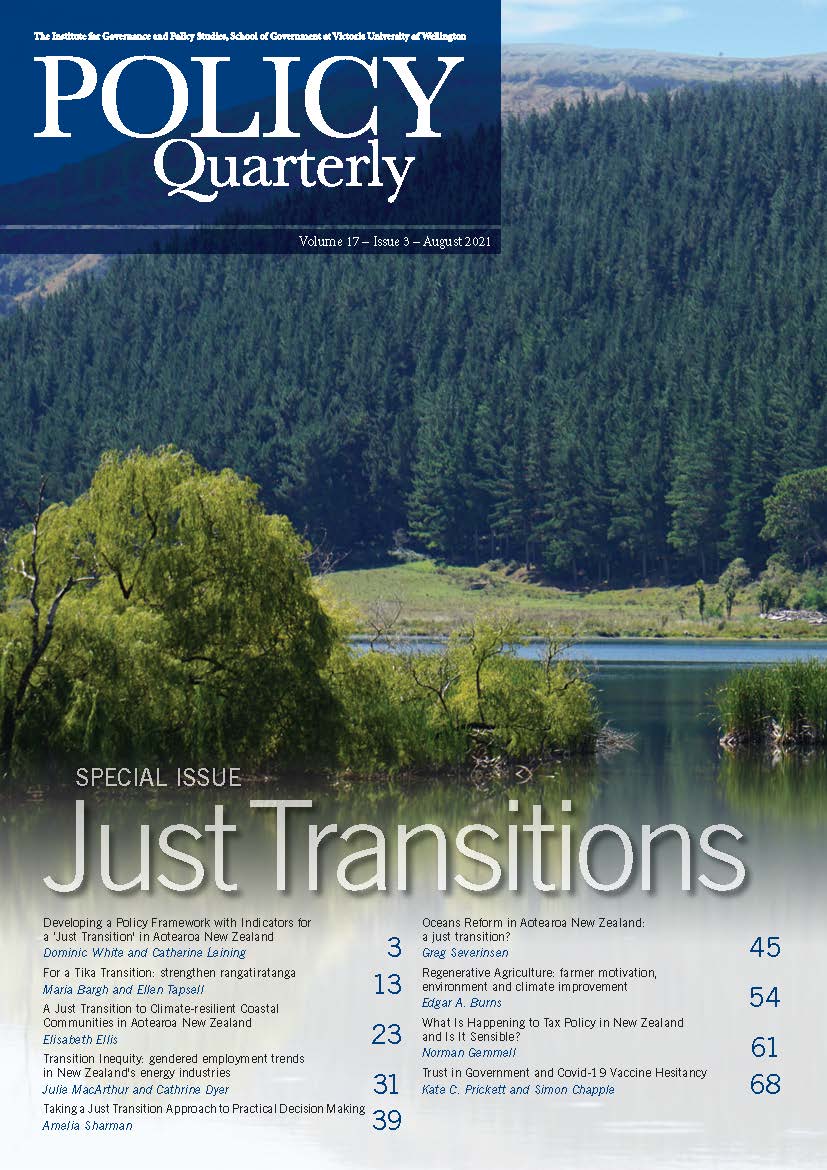
Special Issue: Just Transitions
Vol. 17 No. 3 (2021)The idea of just transitions has greater purchase in public debate than ever before. But it is yet to be properly embedded into the thought and practice of government, business and civil society. This special issue offers concepts and tools to bridge the implementation gap for just transitions in Aotearoa New Zealand. The approach already has a conspicuous champion in the Just Transitions Unit within the Ministry of Business, Innovation and Employment, which supports regional transitions in Taranaki and Southland. But the strains of the low emissions transition cut deeper and wider, exemplified by recent furores over transport infrastructure, land use and agriculture, and managed retreat.
-
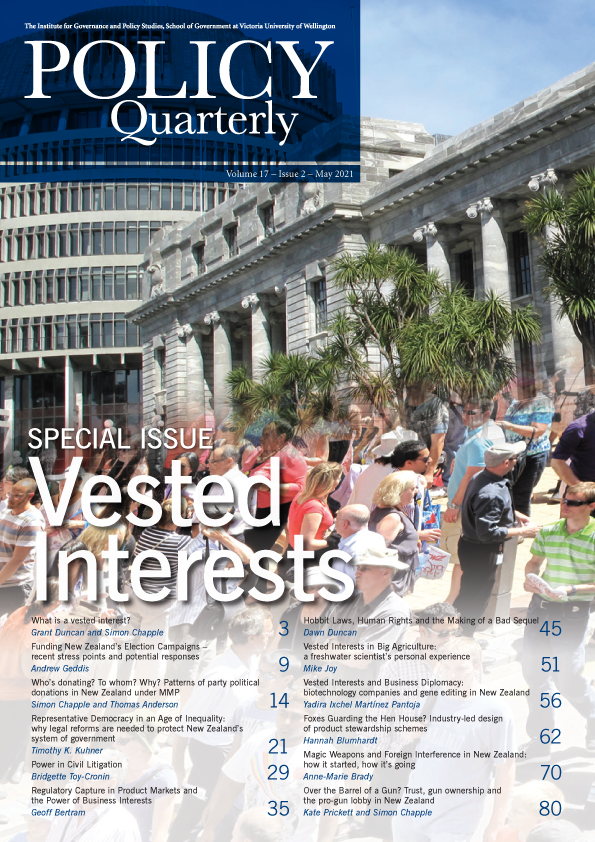
Special issue: Vested Interests
Vol. 17 No. 2 (2021)Under the Institute for Governance and Policy Studies (IGPS) charter, vested interests and the role of political party funding in providing undue leverage for vested interests are an important focus for IGPS research and public engagement. The IGPS, building on the work of its predecessor, the Institute for Policy Studies, has undertaken or supported considerable research and public engagement on these issues. To build on this work, a special issue was planned for May 2020, under the editorship of Grant Duncan of Massey University. Work was well advanced when the Covid-19 pandemic struck and, in line with the IGPS charter’s recognition that our work programme needs to be responsive to the evolving policy context, we deferred the vested interests issue to focus on the policy challenges presented by the pandemic. We thank Grant for deftly changing horses mid-stream and overseeing a very different special issue from that planned through to successful publication. We also thank Grant for generously allowing us as editors of the deferred issue to draw on the work he had done on the special issue before its postponement. The articles in this issue cover a wide range of interrelated topics on the overall theme.
-
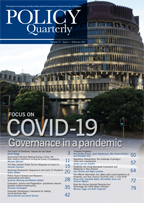
Focus on Covid-19: Governance in a pandemic
Vol. 17 No. 1 (2021)On Saturday, 1 February 2020 something out of the ordinary – at least by New Zealand government standards – happened. The Cabinet, the central decision-making body of executive government, met late at night by teleconference. At the meeting, Cabinet received an update on the novel coronavirus outbreak, including proposed enhanced border measures. Cabinet also authorised a group of Ministers to have power to act to take decisions on New Zealand’s response to the outbreak and border measures. On the following Sunday, 2 February, Ministers with power to act agreed to a series of border measures. Those border measures were kept under review throughout February and into March by the group of Ministers, and Cabinet, with amendments agreed to from time to time.
This issue of Policy Quarterly features articles interrogating and analsying Aotearoa New Zealand's governance under Covid-19. Nearly a year into an unprecedented set of challenges, we examine how our systems and institutions have performed.
-
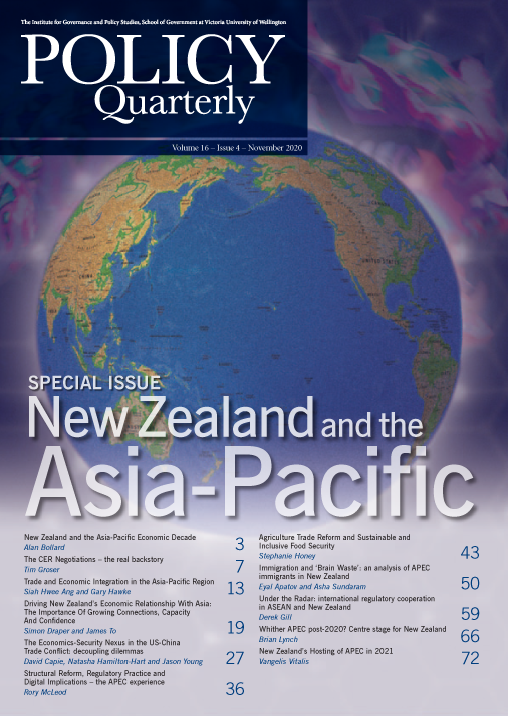
New Zealand and the Asia-Pacific
Vol. 16 No. 4 (2020)New Zealand is a founding member of Asia–Pacific Economic Cooperation (APEC), and will be hosting APEC from December. Accordingly, this issue of Policy Quarterly focuses on New Zealand and the Asia–Pacific. The last decade has seen the Asia-Pacific region undergoing new patterns in economic development, driven by major changes in trade, capital and technology flows, together with demographic disruption. A diverse range of contributors to this issue address critical topics in the fields of trade and international relations.
-
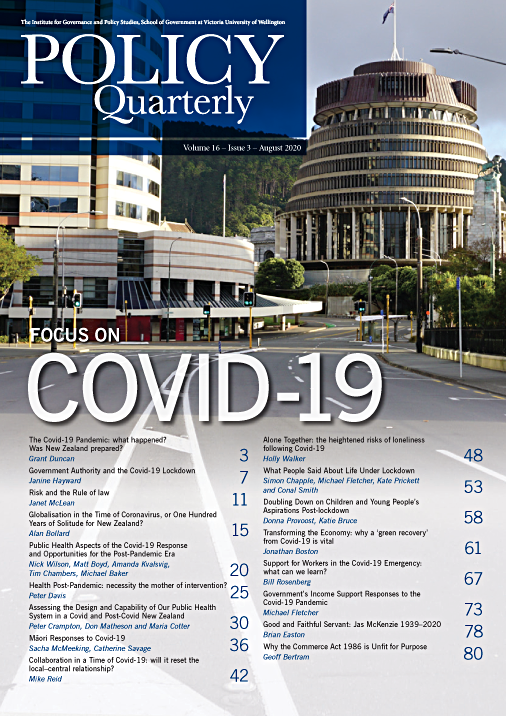
Focus on Covid-19
Vol. 16 No. 3 (2020)The pandemic and our efforts to control it have affected all aspects of our lives and have had significant economic and social costs. People’s lives have been ‘turned upside down’, and everyone has had to make significant sacrifices to help get the country through and to protect themselves and their families. The negative consequences have not fallen equally upon all New Zealanders, however. Those who suffered serious illness or lost loved ones come first to mind. Those with underlying health conditions who had to take extra care, those who had to close their businesses, and those seeking employment in a depressed labour market have suffered much more than those who were in good health all the way through and who worked from home. Many people have suffered from social isolation and loneliness, and schools had to close, disrupting children’s education. On the other hand, many people reported that the lockdown gave them a welcome opportunity to spend more time with family and wha-nau.
The government’s decisions were necessarily made in the face of deep uncertainty – in a this-changes-everything moment – and time was of the essence. The articles herein were drafted largely in May 2020, in the midst of the global pandemic, while New Zealand, with closed borders, appeared to be successfully eliminating the virus. The authors were aiming at a moving target. Our conclusions, therefore, are often speculative. But it was necessary to record, ‘in the thick of it’, what happened, what New Zealand did right, what could be done better in future, and how we recover from the pandemic and its many consequences.
This issue of Policy Quarterly therefore records, from a range of policy-relevant perspectives, how New Zealand was responding to the pandemic during that critical period. Some of those responses could lead to lasting benefits for communities, the healthcare sector and the environment. Future readers will be able to judge with hindsight our responses, and to reflect on the extent to which our concerns and our recommendations have endured. I am confident, however, that the recommendations made by contributors to this issue will be good food for policy thought as we rebuild.
-
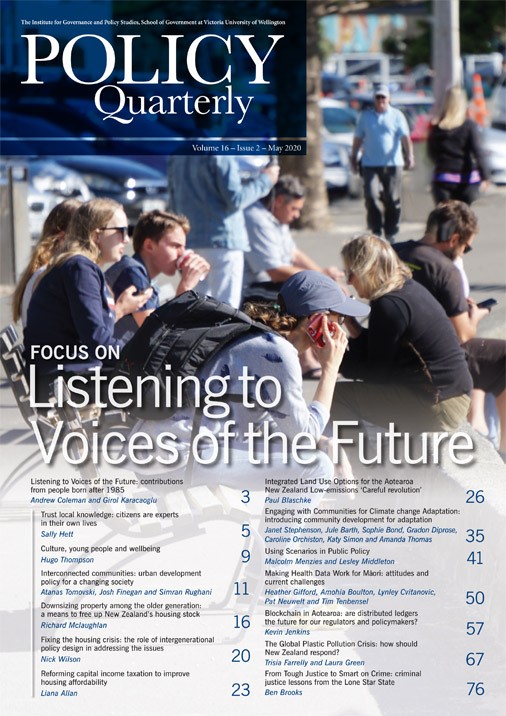
Listening to Voices of the Future
Vol. 16 No. 2 (2020)Intergenerational issues matter. Humanity has acquired an ever-increasing capacity since the industrial revolution to benefit future generations – but, equally, a capacity to inflict immense longterm harm. Unfortunately, there is now substantial evidence that our industrialized civilization is causing serious, widespread and irreversible harm. Globally, this is especially true with respect to biodiversity loss, ecological degradation and climate change.
With this context in mind, the guest editors of this issue of Policy Quarterly – Andrew Coleman and Girol Karacaoglu – invited young New Zealanders with an interest in public policy to reflect on intergenerational issues and offer their vision for the future. Six contributions are published here, together with an introductory and explanatory essay by the guest editors. Collectively, these seven articles comprise the first part of the May issue.
Most of the contributions were completed prior to the grim events that have transformed our world since early 2020. To rectify this gap, I have invited Grant Duncan and Michael Fletcher (who had previously agreed to edit Policy Quarterly in August on a different topic) to seek contributions on the policy issues raised by, and longer-term implications of, COVID-19. Many people have responded to their request. Hence, the August issue will explore a broad range of pandemicrelated matters: constitutional, governance, fiscal, social and environmental.
Jonathan Boston
Editor -
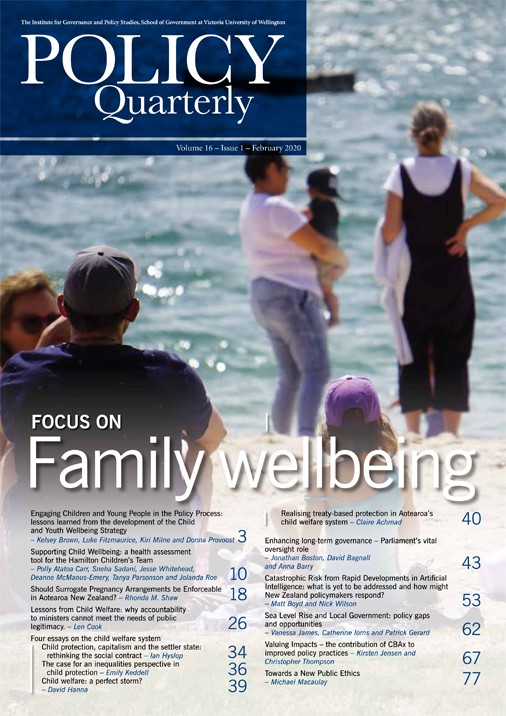
Focus On Family Wellbeing
Vol. 16 No. 1 (2020)In October 2017, the Labour party formed a coalition government with a mandate to address child poverty and with aspirations to make New Zealand the best place in the world to be a child. Towards this aim, the ensuing Child Poverty Reduction Act (2018) legislated that current and future governments set child poverty rate targets and report on their progress, and a corresponding amendment to the Children’s Act (2014) required governments to devise and publish periodic child wellbeing strategies. The articles in this special issue, while heavily focused on some of the most vulnerable tamariki in Aotearoa New Zealand, highlight the centrality of family and whanau wellbeing in stemming the systemic inequities in child poverty and state care. Supporting children involves shifting the public and policy discourse in ways that recognises the primacy of family wellbeing.
-

Special Issue: Focus on Public Service Reforms
Vol. 15 No. 4 (2019)New Zealand is internationally known as a distinguishably ‘entrepreneurial’ country when it comes to administrative reforms. The incorporation of New Public Management ideas through the 1988 State Sector Act and 1989 Public Finance Act has been frequently portrayed as an emblematic case of transformative administrative reform. Since then, New Zealand government has not stood still when it comes to reforms. The Public Finance Act has been amended 58 times and the State Sector Act at least 13 times since they were first enacted. More recently, State Services Minister Chris Hipkins announced what has been presented as the ‘biggest transformation of the Public Service in 30 years’. A new Public Service Act and a new Public Finance Act are now due to replace their predecessors at any time. This special issue of Policy Quarterly brings a most needed and timely reflection on the nature, advantages and potential risks of the proposed reforms. It contains both official and critical views on what we can expect in the upcoming public administrative era in New Zealand, and provides crucial reflections on both philosophical and practical elements of the Public Service Bill and amendments to the Public Finance Act.
-
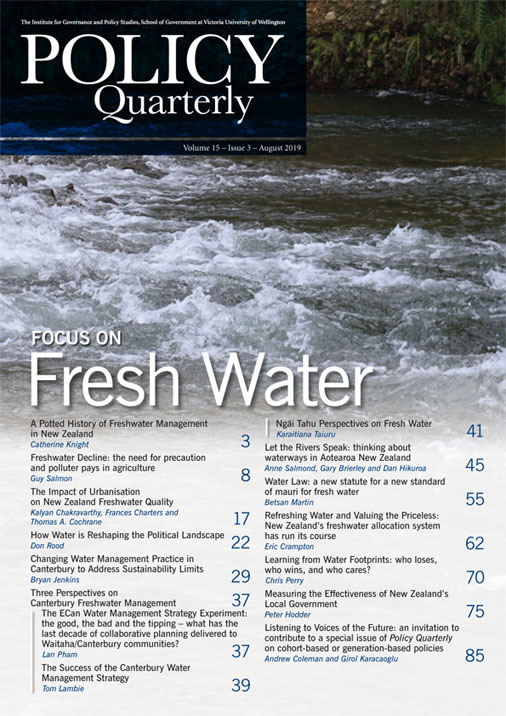
Special Issue: Focus on Fresh Water
Vol. 15 No. 3 (2019)In the last three years, fresh water has surged up the national policy agenda. It is no longer a partisan issue: 82% of New Zealanders now say they are extremely or very concerned about the state of New Zealand’s waterways. As our population and economy expand, the need and demand for water will continue to increase, and so will competition. Climate change will only exacerbate this as water variability and the frequency of extreme weather events intensify. This issue of Policy Quarterly serves as a checkpoint for how far we’ve come and where we could go. There can be no debate that designing and implementing dynamic policy that prioritises governance and incentivises behaviour change is a prerequisite for a sustainable and secure future for New Zealand.
-
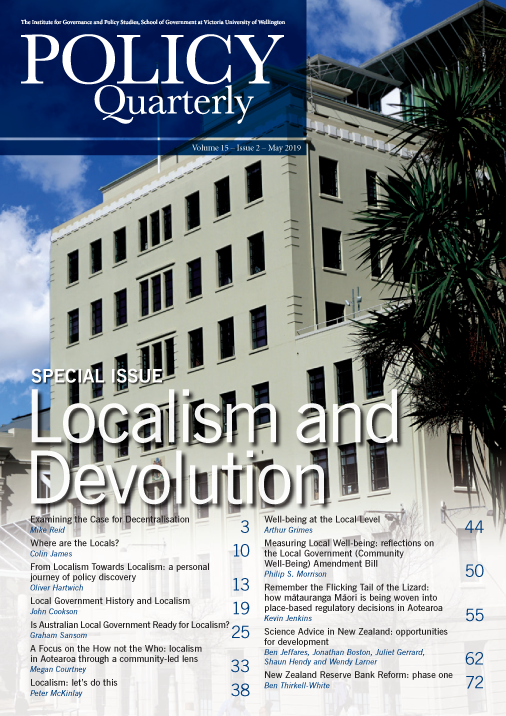
Special Issue: Localism and Devolution
Vol. 15 No. 2 (2019)New Zealand, along with most modern democracies, has a system of multi-level government, with central government having responsibility for matters of national significance and local government matters of local or regional significance. And, like similar democracies, the allocation question – that is, how responsibilities
are distributed across orders of government – is a constant matter of debate. The theme of this issue, which is addressed by many of the articles, is ‘localism’. In the world of public policy localism sits in a constellation of concepts which include subsidiarity, devolution, decentralisation and deconcentration. In its traditional guise localism refers to small units of local government that allow for active participation by citizens. -

Special Issue: Welfare State Reform
Vol. 15 No. 1 (2019)Reform of the welfare state is currently one of the most pressing issues in New Zealand policymaking. For as long as it has existed, the welfare state has been controversial. But the current calls for its reform seem to have extra urgency. Accordingly, this special issue of Policy Quarterly is devoted to welfare reform. The contributions are necessarily broad-ranging, partly because so many different values are at play. As is evident from the depth and breadth of these articles, the potential for reform of the welfare state is enormous. Given its equally enormous importance to the well-being of citizens and the good of society, it can only be hoped that policymakers are ready to take up the challenge.
-
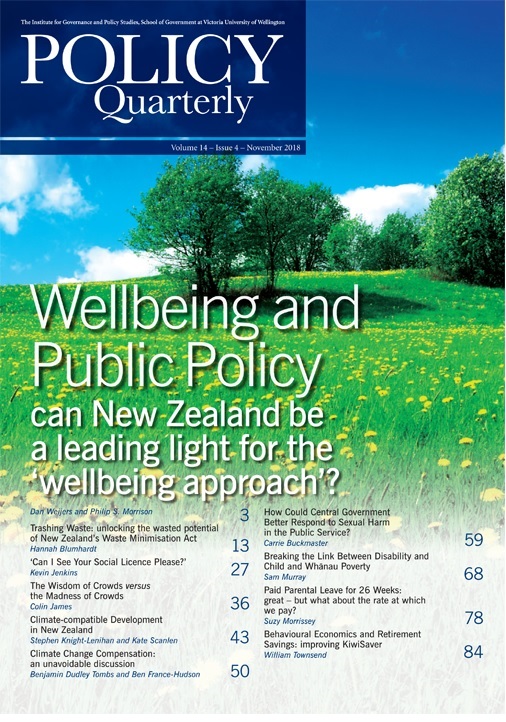
Policy Quarterly November 2018
Vol. 14 No. 4 (2018)This issue of Policy Quarterly leads with an important article on ‘wellbeing and public policy’ by Dan Weijers and Philip Morrison, focusing on some of the key themes and issues discussed at the Third International Conference on Wellbeing and Public Policy, held in Wellington in early September 2018.
-
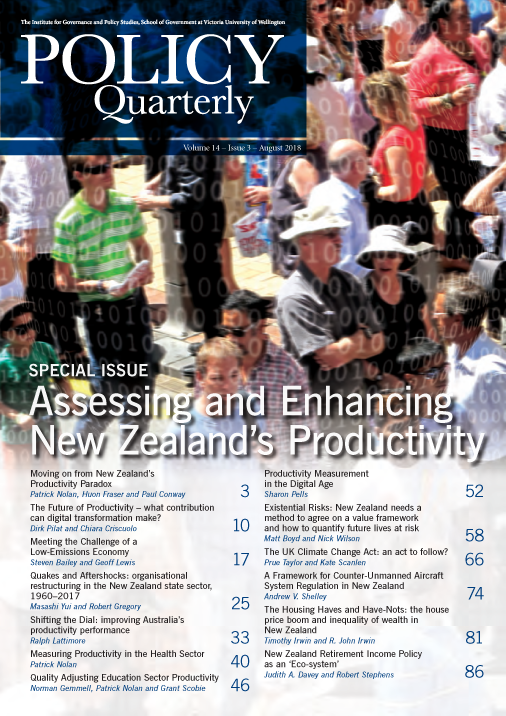
Policy Quarterly Special issue: Assessing and Enhancing New Zealand's Productivity
Vol. 14 No. 3 (2018)Lifting New Zealand’s productivity requires a broad reform agenda, ranging from topics such as matching skills to jobs, to lifting business investment and trade in services, and to improving government productivity. The opportunity is there – we need to take it.
-
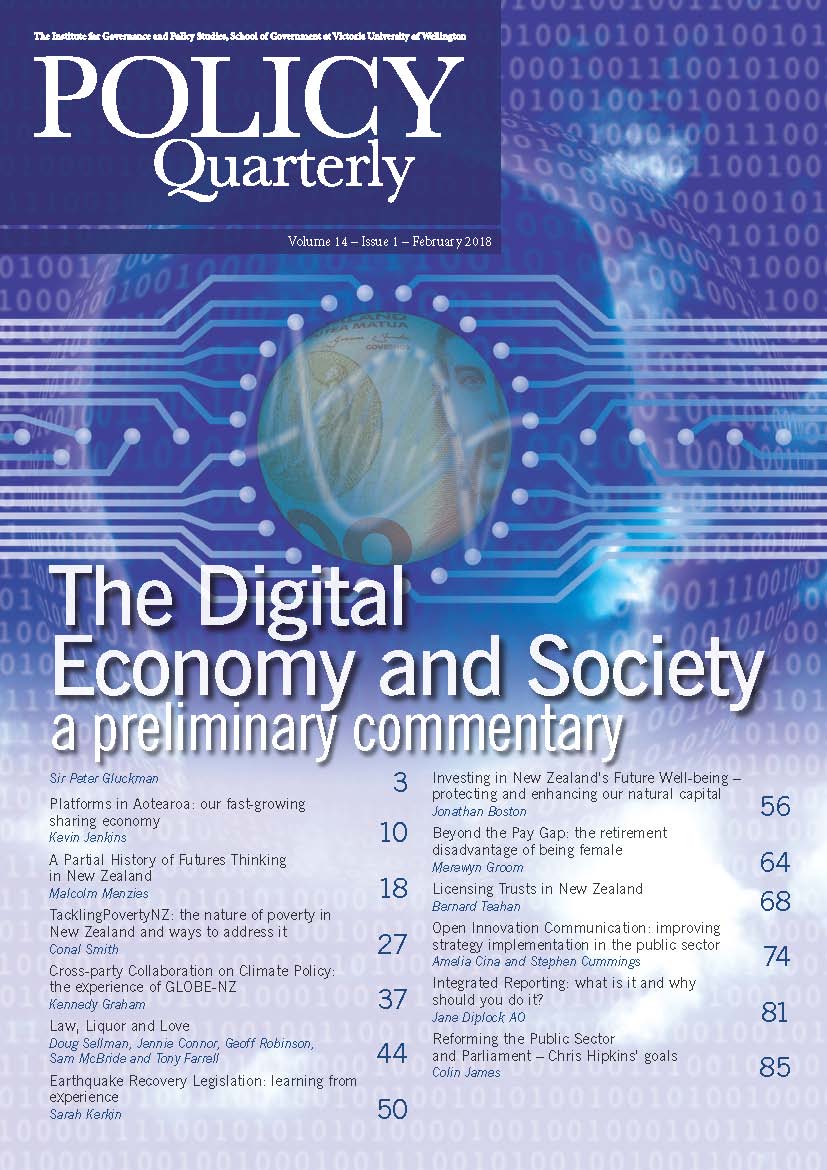
Policy Quarterly
Vol. 14 No. 1 (2018)This issue provides a preliminary commentary on the digital economy and society.

